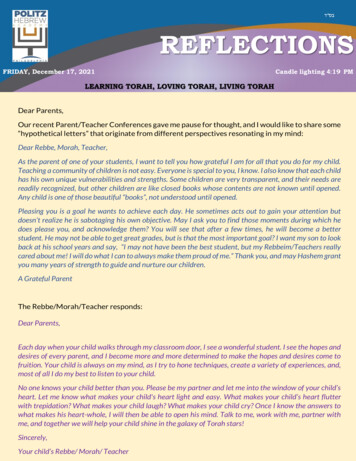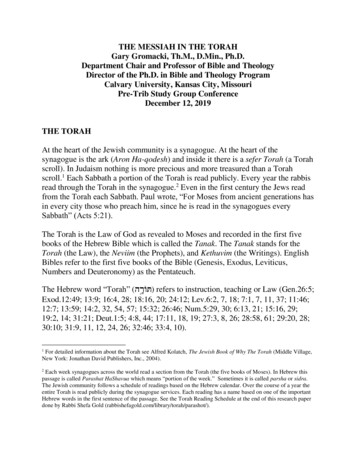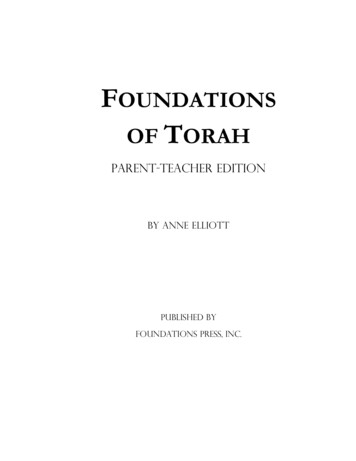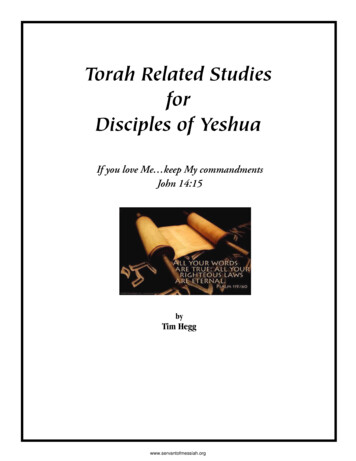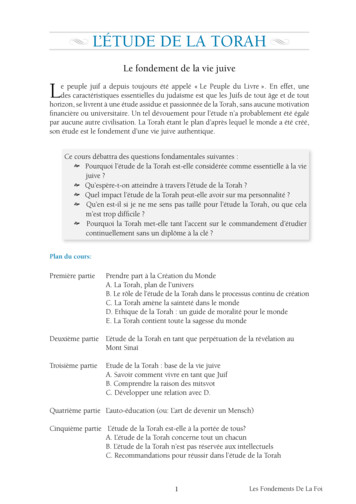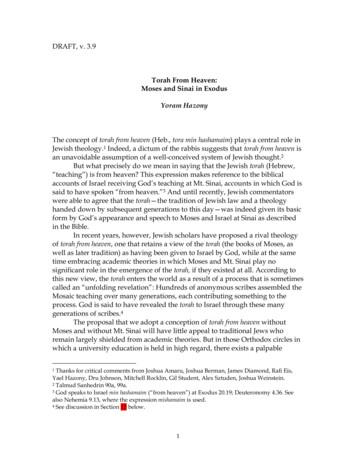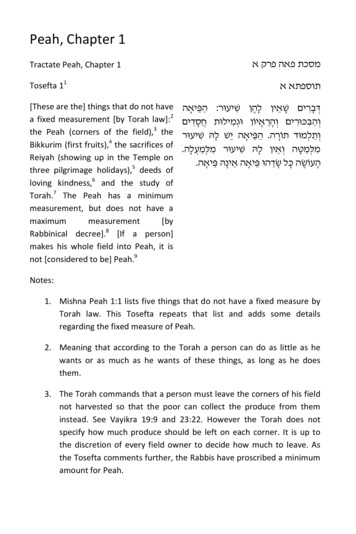
Transcription
RABBI NORMAN LAMMTHE JEWISH CENTERSHAVUOT II, 5730JUNE 11, 1970"WHY MORAL PEOPLE NEED TORAH"A fundamental of Judaism that is a perpetual source of wonderment is the relation of religion and morality.A major part of Torahconcerns the social and ethical obligations of man to his fellowman. Thequestion is, why should it be necessary to have revelation at all forideas and regulations of behavior that man can arrive at independently?Do we not know of societies preceding that of Israel at Sinai which arrived at moral codes by Lhenselvas?Do wa not know individuals who arenot committed to Torah and who nevertheless lead ethical, decent lives?The question is too extensive and the problem too significant,to attempt anything approaching an exhaustive answer.But on this fes-tival of revelation, permit me to commend ore specific line of approach.The site of the revelation is called by two names in the Bible,Sinai and Horeb.The Rabbis, as is their wont, offer us a remarkableinsight by means of a play on words,- hey took these two names ofthis mountain where the Torah was revealed, and related them to twoprathernegative terms. Sinai is reminiscent of sin*ah, hatred, and Horeb tolaurvah, destruction.Essentially, what they mean to say is that Torah,revealed at Sinai-Horeb, is what allows man to avoid hatred and curtaildestruction in the world.Simply put, the Rabbis meant that the Torah is, as Zvi Kolitzhas called it, "the great deterrent" againstlth e innate evil that risesfrom the breast of man.Torah restrains him, it curbs his evil propensi-ties, it allows man to repress his concupiscence and envy by acceptingthe moral code of revelation.
—9-However, just as Judaism acknowledged man's evil inclination,so it posited his native moral intuition*Man is, after all, created inthe Image of God, and just as God is good so does man possess extensivereservoirs of goodness and morality. Man naturally possesses noblewishes, the feel for ethical living, Men are good and virtuous ontheir own, even without divine instruction.Why then is Torah necessary?It is needed because it contri-butes the setting, the structure, the context for moral life.It takesman!s disparate and fragmented moral inclinations, and unifies and integrates them into an overall pattern of living.This is necessary —and this, I believe, is the major importof the Rabbis1 play on words — because there is nothing quite asdangerous as virtues on the loose, ideals gone wild, ungrounded goodness.Without the structure and the grounding provided by Torah, virtues canturn venomous, ideals can devour us, goodness can strangle us. Neverbefore has any generation realized as does ours that moral perfectionismcan turn nihilistic and threaten us with total destruction.What the Rabbis implied is that without Sinai we are at themercy of siriah (hatred) and without Horeb we are at the mercy of hurvah(destruction), all wished upon us by ungrounded virtues. We needTorah not only to curb our yetzer ha-ra, but also to direct the yetzertoy, lest it become a Frankenstein1s monster and turn upon us.Here are but a few immediate examples of how a virtue, overdone, can undo us.
-3Honesty is, everyone will agree, a great ideal. But honestycan sometimes shade into uninhibited frankness, and frankness is oftenused as a tool to humiliate another person, with total insensitivityto his feelings. Honesty, then, can be used as a weapon to crush another human being.The person who honestly tells you what he thinks ofyou, and in the process demolishes your ego, has taken a virtue and,because it is ungrounded in anything deeper and more transcendent, allowedit to become an instrument of evil design.Consistency is another such example.is a desideratum.Certainly, consistencyBut consistency can lead to rigidity, to immoveabili-ty, to an unwillingness to change for the better:since I already madea statement or performed an act, I feel that my future conduct must bemortgaged to consistency with my past.Humility, one of the greatest of all virtues, can prove asource of hurvah.If I feel totally humble and lacking in importancethen I yield to the feeling of impotence with regard to improving myselfor bettering my society.I then lose my self-respect. And a man who hasno respect for himself can have no respect for others. Hence, sin*ah,or hatred.How does Torah solve the prob%m?How does Sinai impede sinTahand Horeb avoid hurvah?Each virtue or ideal, by and of itself, can be destructive ifit follows a straight line of development.are usually counteractive.Great ideals carried too farBut within the context of Torah, within a
-4total religious situation, where moral principles issue from one Sourceand give man the feeling of responsibility to that Source, there takesplace what might be called a dialectical motion:each virtue is checkedand modified by an opposite virtue, and both blend into a third idealthat preserves the best of both.In this manner, all of man T s life isintegrated, unified, elevated.Consider the following illustrations and we shall see howindividual virtues can lead to sinTah and burvah, whereas if they areintegrated dialectically in the context of Sinai and Horeb, they addUPto atorat kayyim, to afl-iving Torah.Idealism is a superb phenomenon.But it also can be deadly.Idealism sometimes.is accompanied by excessive zeal, which turns intoblind passion, and ends up as fanaticism.This is the way of burvah,destruction,Realism alone, a virtue usually poe es-sstl by those of middleage and over, is certainly a virtue for people seriously attempting toconstruct the good society.But realism alone usually turns into resig-nation, the acceptance of evil and corruption, and this gradually becomes reaction, and finally -- cynicism.This is the way of sin*ah orhatred.However, when each reacts upon the other, when each modifiesthe other, when a man has the combination of idealism and realism asa result of his anchorage in Sinai-Horeb, he then has avoided the pitfalls of hatred and destruction.
-5Freedorn is certainly one of the noblest ideals of man. Yet,freedom taken to an extreme is utterly destructive.If everyone will"do his thing" without recourse to a transcendent Judge and without concern for his fellow man, there can be no constructive life.it leads to immorality, and socially it leads to anarchy.PersonallyThis is theway or faurvah.Its opposite is responsibility.taken to an extreme too.But responsibility can bePeople who feel overly responsible for every-one and everything, live under a crushing burden, 11 of existencebecomes joyless, and they begin to lose spontaneity and therefore initiative.People who are constantly oppressed by the burden of respon-sibility, by the guilt feelings that it engenders, hate life. This isthe way of sin h.We have many such examples of each element taken to an extremeby itself.The freedom of parents to crush prenatal life, which nowseems to be in vogue, will eventually lead to utter destruction, becauseit is only a small leap of logic from feoticide to infanticide, to getting rid of infants who may not fulfill our ideals of mental and physicalhealth, or, eventually, ethnic and genetic respectability. The oppositecan also be oppressive and bring hatred and animosity into life: anabsolute decision that never must the life of a feotus be taken. Kalakhah combines freedom and responsibility, and offers us guidelines asto when the one should be exercised, when the other. When freedom andresponsibility react upon each other and with each other, dialectically,
- 6we have attained the moral maturity of Judaism.Reason or intellect have always been accorded the greatestrespect in both the Jewish and Western traditions. Yet, by themselves,they make life insufferable.In our own days they have resulted in thepassion for research, harsh and cruel techonology, the depersonalizationof society, the fostering of inhumanity.Parents and children arestrangers to each other, husband and wife barely know each other, teachers and students are related to each other as employer and employee oreven worse. This is the way of sinTah, hatred.Reason must be merged with emotion.and expression alone are also inadequate.But emotional experienceThe New Romanticism of thecampus has tried to correct the balance by reintroducing into Americanlife the validity of sentiment, feeling, heart.But it has tended toignore the element of intellect, it has tended to downgrade the role ofthe academy as a meeting place of ideas and criticisms. And so, thisNew Romanticism and celebration of emotion and sentiment have turnedinto hysteria, to a clash of blind passions, the way of laurvah, or destruction.When we take these two ideals together, and allow them to playupon each other and modify each other, then we have the adam ha-shalem,the "whole man" of Jewish tradition.The samepight be said for love and discipline.Love by itselfcan lead, amongst equals to promiscuity, and from parents to childrento what has been called "smother love," to a warping of the child*s per-
-7sonality.It is the way of burvah. Discipline alone leads to rigidity,to a lack of warmth and affection in family and society, to a sense ofisolation and alienation by the individual who feels crushed in hisloneliness.It is the way of sinTah or hatred.Together they lead tothe fullness of Jex ish life, to the interplay of din and rakamim, justiceand mercy, which is the reflection in human society of the attributes wenotice in God.As a last example, we might take the tendency to look to thepast and the one to look to the future.There are those who, especiallyin Jewish life, seem fixed upon the past. Their entire Jewish expressionis one long yizkor.But this is the counsel of despair, it reflects asense of unhappiness and even sinTah towards conditions that prevailtoday.The other extreme is that of ignoring the past and acting as ifwe can create Jewish life de novo, all from a fresh beginning, lookingonly to the future and ignoring our roots. This is stupid, it is thewav f kurvah, or destruction.A true Jewish attitude requires consider-ation of the past and looking to the future at the same time. To driveon the highway of life, according to Jewish teaching, we must keep oureyes on the road ahead, but every now and then, regularly, look at therear-view mirror to know where we have come from.It is worth repeating what I have said before from this pulpitanything worthwhile is really worth repeating occasionally --in thename of the great Kotzker Rebbe. He said:klug iz krum, intelligencecan sometimes lead to crookedness, as intellect is abused for corrupt
-8ends.Gut iz niTuf, goodness can sometimes lead to immorality, when outof sheer love one consents to demands that are immoral. Frum iz shlecht»piety can sometimes be malicious, when it is expressed as self-righteousness and intolerance. Aber gut un klug un frum, das iz a Yid -- when youcombine these virtues of goodness and cleverness and piety, then you havethe whole Jew.All that we have said on Revelation as the unifying factor inthe moral life, on Torah as the undergirding and transcendental stabilizing factor of virtue, we can find in a famous passage in the Book ofRuth.When Boaz first makes the acquaintance of Ruth, he blesses herin the following words:* * fe J o U & i/!7 J ? fi 5'"May the Lord recompense thy work , and may thy reward be complete fromthe Lord the God of Israel, under whose wings thou art come to take refuge" (Ruth 2:12).The Malbim asks:is not this verse repetitious?and the second repeat each other —The first halfthe Lord recompense your work, mayyour reward be complete.Ko, answers the Malbim, there is no redundancy here; each expression means something different. 6 8 O andwards for different kinds of activities.the o)o 9 the artisan, whereas*")! } r , the day laborer. J "M;a«jJ are re- J) is the wages ofA / o )- k Ais the salary of theThe poel (artisan) is one who is paid forpiece work, he is compensated only for what he achieves, no matter how
-9-long it takes him or how little time he spends on it.The sakhir,however, is paid not for achievement of specific tasks, but for thetime he spends in his labors, whether it be an hour a day a week amonth or a year.What Boaz said to Ruth is this:your work as a poel.may God compensate you forBefore you accepted the Revelation of Sinai-Horeb,whilst you were yet outside the community of Israel, you were a highlymoral person, one who was ethically gifted.Everything you accomplishedthat was noble and decent will receive its reward from God.But youwill be compensated as a poel, only for what you achieved that was deserving and noble.But you lacked an overall pattern; your life wasmoral, but only in its individual expressions, not as a totality.Now,however, that you have come to rest under the wings of God, that youhave accepted the Torah of Sinai-Horeb, all your life is integrated inthe service of God, every moment is lived under this great commitmentto the Covenant.Now God judges the overall pattern of your life, He seeshow your virtues blend and mesh and merge, and He considers not yourindividual acts alone, but their totality -- you are a sakhir, and yourreward will be great and complete, not only when you are actively engagedin particular moral missions, but in their totality.As a Jew and theheir of the Sinaitic tradition, your reward is shelemah, whole, as youhave come to place your entire life in all its aspects under "His wings."Without Torah, without Revelation, we can have at mostp ft i a)moral credit for indidivudl deeds, and, at worst, the ravages of sin1ah
-10fourvah, hatred and destruction.Let us rededicate ourselves on this Shavuot, once again, tothe great Covenant of Sinai, the great heritage of Horeb, so that notonly will the Lord recompense our work, but that our reward, our Jbe complete and whole before the Lord God of Israel.
Essentially, what they mean to say is that Torah, revealed at Sinai-Horeb, is what allows man to avoid hatred and curtail destruction in the world. Simply put, the Rabbis meant that the Torah is, as Zvi Kolitz has called it, "the great deterrent" againstlth e innate evil that rises from the breast of man. Torah restrains him, it curbs his evil .

